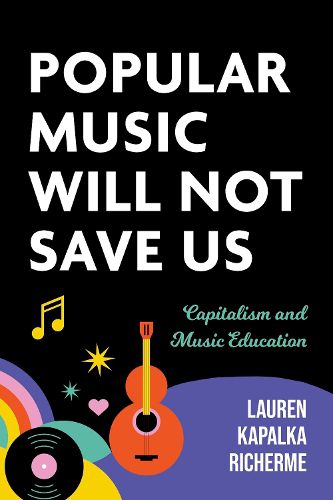Readings Newsletter
Become a Readings Member to make your shopping experience even easier.
Sign in or sign up for free!
You’re not far away from qualifying for FREE standard shipping within Australia
You’ve qualified for FREE standard shipping within Australia
The cart is loading…






In today's globalized landscapes, both traditional and progressive K-12 music education practices, including those associated with popular music, can further capitalism-related inequities. In this context, music educators and students might consider how they position themselves and their music-making practices in relation to capitalist aims and processes and confront the more unethical aspects of capitalism.
Popular Music Will Not Save Us challenges music educators to rethink their philosophical stances in the face of contemporary capitalist values and explores the intersection of music education and globalized capitalism, unveiling how certain practices exacerbate material inequities and erode social responsibility. As author Lauren Kapalka Richerme unravels the complexities of music education, her analysis sheds light on how prevalent practices can inadvertently uphold capitalist ideals and reinforce individualism, unceasing accumulation, and precarity in the workforce. Given that no musical genre inherently challenges problematic aspects of capitalism, Richerme proposes that music educators instead focus on affective flows, or the circulation of sensations within pedagogical spaces, and consider four alternative positionalities: thriving within, surviving under, resisting, and challenging capitalism.
Popular Music Will Not Save Us advocates for a shift away from capitalistic individualism and inequities and toward a more equitable, affective pedagogical mode. Now is the time to transcend traditional boundaries and embrace a new paradigm that prioritizes social impact over commercial gain.
$9.00 standard shipping within Australia
FREE standard shipping within Australia for orders over $100.00
Express & International shipping calculated at checkout
In today's globalized landscapes, both traditional and progressive K-12 music education practices, including those associated with popular music, can further capitalism-related inequities. In this context, music educators and students might consider how they position themselves and their music-making practices in relation to capitalist aims and processes and confront the more unethical aspects of capitalism.
Popular Music Will Not Save Us challenges music educators to rethink their philosophical stances in the face of contemporary capitalist values and explores the intersection of music education and globalized capitalism, unveiling how certain practices exacerbate material inequities and erode social responsibility. As author Lauren Kapalka Richerme unravels the complexities of music education, her analysis sheds light on how prevalent practices can inadvertently uphold capitalist ideals and reinforce individualism, unceasing accumulation, and precarity in the workforce. Given that no musical genre inherently challenges problematic aspects of capitalism, Richerme proposes that music educators instead focus on affective flows, or the circulation of sensations within pedagogical spaces, and consider four alternative positionalities: thriving within, surviving under, resisting, and challenging capitalism.
Popular Music Will Not Save Us advocates for a shift away from capitalistic individualism and inequities and toward a more equitable, affective pedagogical mode. Now is the time to transcend traditional boundaries and embrace a new paradigm that prioritizes social impact over commercial gain.